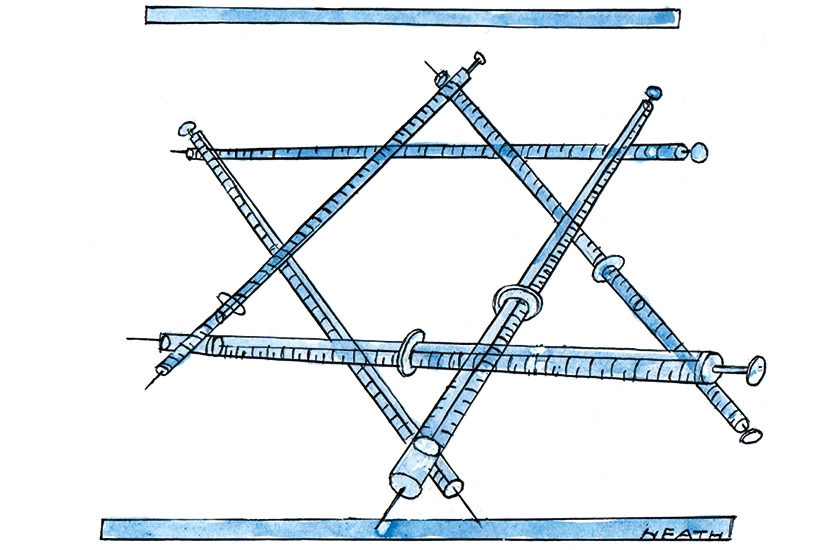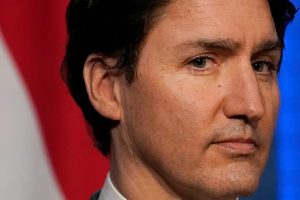For Israeli critics of Benjamin Netanyahu, myself included, these are rather difficult times. It’s hard for us, or anyone, to deny that he appears to be leading the world in vaccinations against COVID-19. In less than four weeks, two million Israelis — my parents and many friends among them — have received their inoculations. A project spearheaded by the prime minister himself promises a return to almost normal life. I’m under 50 and have no underlying illnesses, but am still confident of getting my own vaccine in a couple of weeks.
Our world-beating jabbing speed means we have covered 20 percent of the population. Britain, which has made far more progress than any other European country, has covered less than 5 percent. The world’s eyes are on Israel because of what happens next: will COVID hospitalizations now start to fall as fast as the models suggest? ‘We’re literally at the moment of truth for the world,’ says Professor Eran Segal of the Weizmann Institute. ‘If the vaccine acts in the way Pfizer has said it does, at the end of this week we’ll start to see in Israel the proportion of serious cases in the over-60 group begin to go down. This is the money-time.’
For Netanyahu’s diehard supporters, the ‘Bibistim’, this is just further proof — not that any was needed — of King Bibi’s magical powers. Only he could have personally phoned up the CEOs of Pfizer and Moderna to secure early shipments of the vaccines to a small country in the Middle East. The numbers don’t lie, they cry, as they post the latest graphs on their social media accounts, showing Israel on track to emerge from the pandemic months ahead of the rest of the world.
At this rate, most Israelis will have been inoculated from the plague by the end of March, perhaps earlier. Netanyahu’s many detractors, the small majority of Israelis who voted in the past couple of elections for the hopelessly divided parties of the opposition, see also another date around that time: March 23, election day yet again. How convenient for the embattled prime minister, who is currently lagging in the polls.
Typical Netanyahu. After 10 months of his government’s shambolic handling of the coronavirus — for part of which Israel was the world leader in the daily infection rate — and three nationwide lockdowns (we’re still in the third) the vaccine has arrived just at the right time to revive his political fortunes. The rollout is coinciding perfectly with his election campaign. Lockdown means no election rallies — but every day he visits vaccination centers across the country. He greets the latest shipments from Pfizer at the airport.
After more than a decade in power, he is eager to claim ownership over everything that has worked for Israel — especially its hi-tech economy. His opponents are quick to shoot back that the foundations were laid by Yitzhak Rabin’s Labour government, which injected massive amounts of cash to set up a venture-capital sector in the early 1990s. In a political landscape which has been polarized over one issue, with the prime minister clinging to power, neither side is prepared to give credit. Netanyahu’s wastrel son Yair boasts in lectures that, before his father arrived on the scene, Israel had no exports ‘besides oranges’. When critics of the prime minister tweet that they have been vaccinated, Yair likes to taunt them by saying they have his father to thank.
The opposition has a counter-narrative. Don’t thank Bibi for buying vaccines with your tax money, as if it’s his money. Thank Israel’s public health system, the legacy of the nation’s socialist founding fathers, which geared up overnight to seamlessly deliver the vaccines in hundreds of locations across the country. There’s a great deal of truth to this narrative: but Israel isn’t Britain, with its fetishizing of the NHS. Voters won’t be voting for their doctors. Besides, the socialist legacy is a bit more complex.
The workers’ unions and political parties that built the Zionist enterprise didn’t bequeath Israelis one national health service, but four of them. And more than a century since they were founded, long after losing any party affiliation, they continue to compete with each other for members and for government funding.
Typical Israel. It built an unwieldy yet technologically advanced system of publicly funded health services which compete as if they were in the private sector. The only business model for their survival is to hold on to members (and perhaps attract a few more) by constantly improving their customer service. At the same time, they focus on preventative medicine to keep down the heavy costs of hospitalization. The key is homegrown medical technology. All Israelis now have the most detailed digitized doctors’ records and medical files (which go back decades) of anywhere in the world.
So was it Netanyahu’s persuasive phone-calls that has put Israel on the vaccination superhighway? Or simply the prospect of having easy access to the medical data of an entire vaccinated country that convinced the pharmaceutical giants to expedite shipments to Israel? Choose the narrative that suits your political views.
The same is true of another question mark looming over Israel’s vaccination success — what about the five million Palestinians in the West Bank and Gaza Strip? When will they get their vaccinations — and isn’t Israel responsible for them?
Here, again, there are two convenient narratives. Israel’s constant critics maintain that the Palestinians are living under Israeli occupation and therefore the world should not be applauding Israel’s vaccination success until they are jabbed as well. Israel’s knee-jerk defenders see this an anti-Semitic harangue and insist that the Palestinians in West Bank and Gaza are living under their own autonomous rule and vaccines are the Palestinian Authority’s sole responsibility.
The truth of course lies somewhere in between. Under international law, Israel remains the ‘occupying power’ and is therefore responsible under the Fourth Geneva Convention for the Palestinians’ health. At the same time, health issues were ‘delegated’ by the Oslo Accords to the Palestinian Authority, with Israel retaining overall responsibility if and when needed. For his part, Netanyahu has been posing as the vaccine unifier — visiting the town of Tira to urge its Arab minority to ‘come and be vaccinated’. He said the words in Arabic.
In public, the Palestinian leadership insist they don’t need Israeli help and are going to inoculate their population with the Russian Sputnik vaccine. In private, Israeli officials admit that Israel will help the Palestinians with Israel’s own surplus vaccines, as soon as they’ve finished vaccinating most Israelis. If things were different, they might even have considered passing them vaccines earlier — but there’s that election on March 23. As Netanyahu knows, it’s quite possible that Israelis will be protected by then. Vaccinations for Palestinians, justified or not, won’t win any votes.
This article was originally published in The Spectator’s UK magazine. Subscribe to the US edition here.


















